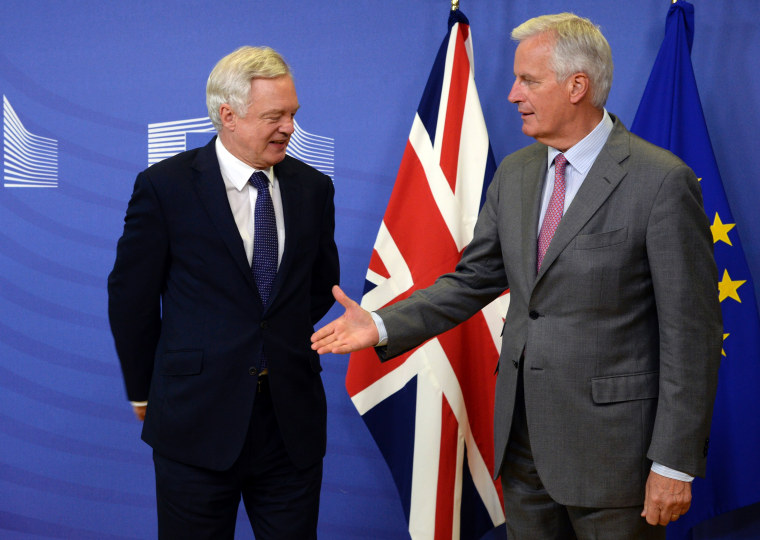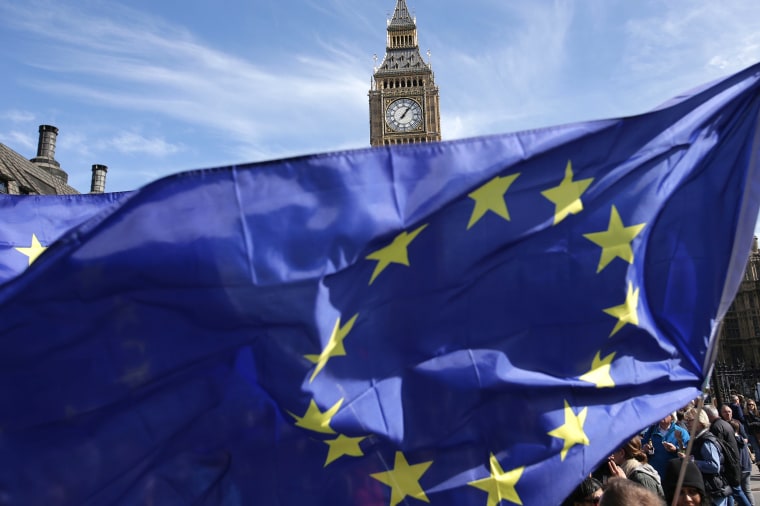Britain has offered to pay much of what the European Union was demanding to settle a Brexit “divorce bill,” bringing the two sides close to agreement on a key obstacle to opening talks on a future free trade pact, E.U. sources said on Tuesday.
British newspapers valued the offer at around 50 billion euros — or $59 billion. It reflected the bulk of outstanding E.U. demands that include London paying a share of post-Brexit E.U. spending on commitments made before Britain leaves in March 2019 as well as funding of E.U. staff pensions for decades to come.
A British government official said they “do not recognize” this account of the talks going on ahead of a visit by Prime Minister Theresa May to Brussels on Monday.
Europe's chief Brexit negotiator said Wednesday that he hoped to report to the E.U. in coming days about an agreement with Britain on the financial terms of its withdrawal from the bloc.
“We are working really, really hard on these subjects,” Michel Barnier said, adding: “I hope that I can report that ... we have been able to negotiate a deal.”

Barnier is due to meet with British Prime Minister Theresa May and European Commission President Jean-Claude Juncker on Dec. 4.
Juncker has previously estimated Britain would owe roughly 60 billion euros. E.U. officials say Brussels is willing to work with May to massage those figures in order to help her win backing from hardline Brexit supporters who have in the past insisted that Britain owes Brussels nothing.
Foreign Minister and Brexit campaigner Boris Johnson previously suggested the E.U. was making "extortionate demands."
The E.U. set the condition of “significant progress” on three key elements of a withdrawal treaty before it would accede to London’s request for negotiations on a free trade pact that could keep business flowing after Brexit in 16 months.
Related: British fruit left to rot as looming Brexit squeezes seasonal labor
It set a deadline of Monday for that progress to be made if E.U. leaders were to give a green light at a summit on Dec. 14-15.
On the issue of the rights of E.U. citizens in Britain, E.U. negotiators are still pressing Britain to accept that European judges should have a final say on enforcing those rights.
If the financial settlement, which many British businesses have argued May should make in order to avoid a disruptive “cliff edge” departure from the single market, is forthcoming, the thorniest outstanding issue is that of the Irish border.
Related: Old Border, New Worries
“Ireland remains the most difficult issue,” a senior E.U. diplomat said after Irish Prime Minister Leo Varadkar avoided a disruptive snap election when his deputy resigned on Tuesday at the insistence of the party propping up his minority government.
Britain has yet to satisfy E.U. — including Irish — demands that it clarify how it would avoid a “hard border” with customs posts on land between Northern Ireland and the E.U. Many fear that would disturb the fragile peace in the British province.
